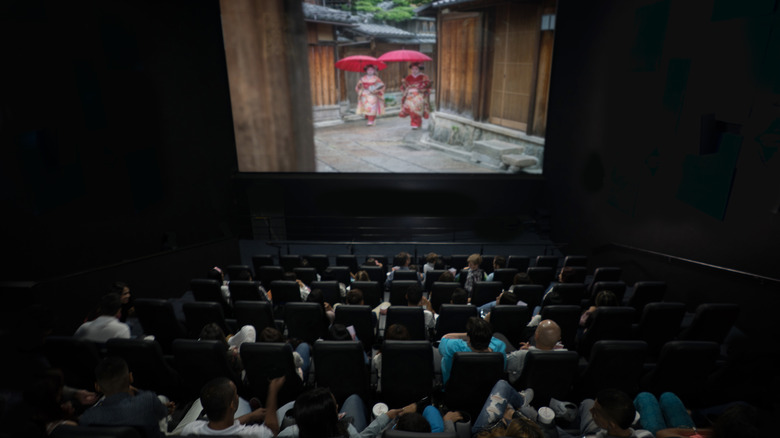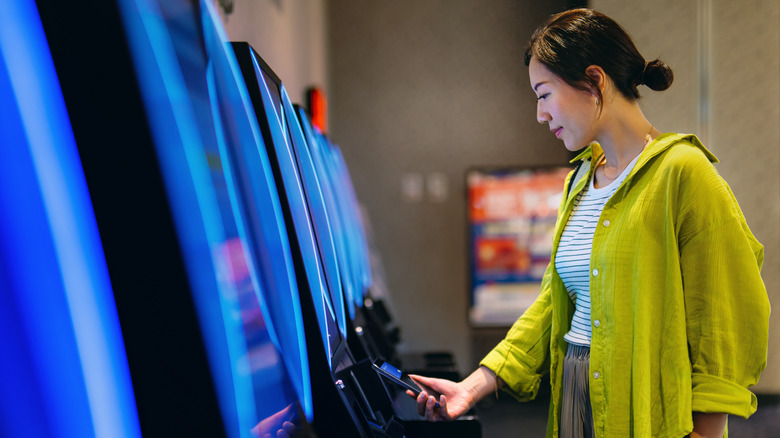Unspoken Etiquette Rules Tourists Should Follow At Movie Theaters In Japan
If you've ever visited Japan, you'll know that there are some things you should never do. Good manners and proper consideration for others are very highly valued, with some claiming that Japan is the most polite society on the planet. In Japan, there is a social etiquette expectation for almost everything, whether you're entering someone's home or using a public restroom. It goes without saying that attending the cinema in Japan is no different. In order not to offend the locals, you should prime yourself on some of the social rules before visiting.
Amongst the many cultural delights Japan has to offer is a rich and versatile cinematic history. From samurai movies to anime, Japan has certainly left its mark in the pantheon of cinema. To make the most of your cinema experience on this magical island, there are certain social norms you should practice to avoid causing friction. Although you are not expected to become a master of all protocols and customs, social etiquette will go a long way as a tourist – and at the movies.
Things to know before the movie
Japanese cinema culture is believed to have begun around 1897, with very early "ghost films" such as "Jizo the Spook" being screened around this era. The first production studio was then opened in 1909, and the rest is history. The Japanese have become masters in the art of visual storytelling since, producing companies such as the internationally loved Studio Ghibli, as well as terrifying cult classics like "The Ring" and "The Grudge," known the world over for being some of the scariest films in the game.
Before heading out to check out what modern masterpieces Japan might have to offer, it's important to remember to book your ticket online beforehand. Japanese theaters are traditionally found in malls, with the exception of smaller "meigaza" theaters, which only screen the classics. These multiplexes usually have electronic pre-booking ticket systems and strict seating rules. Regular ticket prices range from ¥1500 to ¥1800 ($9.78 to $11.74), although there are frequent special offers to encourage attendance. For example, "Happy Days" are the first day of the month, with tickets only costing ¥1100 ($7.17). There are also Ladies' Days, Couples' Days, and discounts for students.
As a tourist, you may struggle to find films in English. Japanese theaters prioritize screening domestic Japanese films, with foreign films sometimes taking up to a year to be released. These films are also usually dubbed in Japanese. You can find a list of screenings in English here. The film ratings system is also different from what you may be used to, with films rated G, PG-12, R15+, and R18+.
Once inside the theater
Japanese movie concession stands will not disappoint you. Sometimes offering limited edition character-inspired snacks, Japanese theaters also famously have an unbelievable variety of popcorn flavors ranging from the classics like salt and caramel, to weirder ones like "steak," "Hokkaido butter soy sauce," and "Italian pizza." You can also purchase alcohol in most theaters, and some are even equipped with a smoking room.
Japanese hospitality knows no bounds, with some cinemas offering blankets for chilly customers and cushions to cinemagoers who might be shorter than the person in front of them. Once inside the cinema, make sure to stick to your allocated seat as breaking the seating rule shows disregard for your fellow cinemagoers. Of course, remaining silent in the cinema is a must, even during scenes of high tension or laughter. Most Japanese cinemas also encourage you to turn off your cell phone when entering, with the use of cell phones during the movie highly frowned upon by fellow spectators.
Perhaps the most unique part of the movie experience in Japan is that filmgoers will stay until the absolute end of the movie, until the last credit has rolled, to show respect for all the people who worked on the film. This symbolic gesture reminds us that film is an elaborate and collaborative art that involves a multitude of people. Make sure to take your trash with you when you leave, and show as much consideration for others in Japan as they undoubtedly will towards you.


